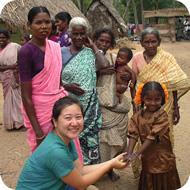UC Berkeley's Institute for the Study of Social Change has awarded its second annual Thomas I. Yamashita Prize to I School doctoral student Melissa Ho. The prize was presented in a ceremony at UC Berkeley on Thursday, May 22, and honors Melissa's work using Information and Communications Technologies to address poverty in developing regions. The $2500 prize honors individuals who are "engaged in social change, not just studying it."
Melissa researches Information Communication Technologies for Developing Regions (ICTD) and social entrepreneurship; she also develops innovative information technologies that can be used to help the world's poor and to improve the delivery of health care in developing regions of the world.
In 2004 and 2005, she travelled to rural India with Intel Research Berkeley to help set up wireless networking for remote eye care clinics for Aravind Eye Hospital. In 2005, she also had the opportunity to contribute to tsunami relief efforts in Tamil Nadu. She then traveled to Mexico while working on a class project to set up a low-cost offline Wikipedia server and computer lab for an orphanage in Tijuana.
In 2005, Melissa worked on building high-bandwidth connections between the universities in Ghana in order to foster dialog, the sharing of information, and improved education in those communities.
In 2006, she began to focus on improving healthcare delivery to Sub-Saharan Africa, working on the Ghana Consultation Network to link doctors in 4 hospitals with their diasporic counterparts around the world. This network allows doctors to improve continuing medical education, which is critical for increasing the capacity and quality of African-trained doctors.
In 2007, Melissa traveled to Goma in war-torn eastern Congo, where she worked with the HEAL Africa hospital. In Goma, she helped set up wireless networks and enhance the hospital’s engineering equipment, to improve the hospital's ability to care for victims of HIV and the local civil war.
In 2007, Melissa also participated in a study of smartphones in the healthcare system in Uganda with the East Africa Blum Fellows.
While at Berkeley, Melissa has organized ICTD reading groups and seminars to identify and inspire students interested in this field of work. Her research focuses on identifying the real needs of the world's poorest and the ways innovative network technologies can be used to significantly address these needs, in addition to understanding the combination of institutional, political, and cultural factors necessary to create truly sustainable solutions.
In Melissa's blog, she commented on the future of academic research in ICTD:
"I have to wonder if in our efforts to look at ICTD academically we’re going to create another glut of idealists with nowhere to go. But there’s so much to do!
"I have been watching interest in this area grow over the past three years, and have high hopes that the entrepreneurial spirit of this generation of business school and international relations graduates will be able to look beyond the traditional NGO positions and forge ahead with their own grassroots efforts. And of course, that this crop of people will be well trained to listen and live with the communities they want to help, and genuinely provide services that the communities need in a way that they can sustain them."
The Thomas I. Yamashita Prize is awarded by the UC Berkeley Institute for the Study of Social change to honor unsung heroes, the workers behind the scene, the ones who carry on the work of advocacy organizations, the “go to” members of a group dedicated to social change. In many instances, these individuals are neither the best known nor the most vocal members of the organization, but their knowledge, insight, expertise, and work ethic establish the foundation for the organization. Often, they are also the missing voices in efforts to clarify and to understand how progressive organizations have functioned, how they succeeded or failed. The goal of the award is to bring this untapped expertise into both the research and education of future practitioners of change.
Read related article from the UC Berkeley NewsCenter.










